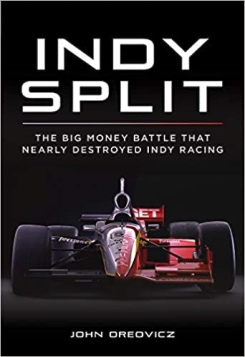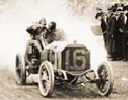Book Review
by Russell Jaslow
Indy Split: The Big Money Battle That Nearly Destroyed Indy Racing

by John Oreovicz
Octane Press
ISBN: 978-1-64234-056-3. List Price: $35.00.
  It's hard to believe it's been 25 years since the Month of May was torn asunder by dueling 500-mile open wheel races -- Indy and U.S. And with it, Indy car racing, arguably closing in on Formula 1 as the the world's most competitive, exciting, popular form of open wheel racing, began it's slow and painful circling of the drain. It's hard to believe it's been 25 years since the Month of May was torn asunder by dueling 500-mile open wheel races -- Indy and U.S. And with it, Indy car racing, arguably closing in on Formula 1 as the the world's most competitive, exciting, popular form of open wheel racing, began it's slow and painful circling of the drain.
It was also the beginning of the Internet and shortly before the dawn of social media. Race fans didn't just get a front row seat, they were active participants. First on the Usenet groups and then on the message boards of websites like crapwagon and trackforum. The civil war waged on all levels -- in the stands at tracks, in the shops of teams, in the boardrooms of corporate sponsors, and in the living rooms of fans.
As a racing journalist, John Oreovicz reported it all, probably at times with horror. In his new book Indy Split: The Big Money Battle That Nearly Destroyed Indy Racing he recalls all the gory history. Not just the IRL-CART battle, but the original USAC-CART split, and even before that -- when the seeds of discontent were planted in the 1960s with the foreign invasion and rear engine technology.
In that respect, Oreovicz did an excellent job. As a reporter, he lays out the facts, the timelines, and the quotes. You immerse yourself, reliving it all, and remembering events you may have forgotten. Most importantly, no matter the side of the fence you sat on, you realize two things -- why your side should have won and why your side was never as strong as you thought. And finally, what a colossal waste the whole sordid affair was.
However, Oreovicz doesn't go far enough.
Though this is a fine recollection of this piece of racing history, it is not an investigative piece of journalism. What really went on inside the board meetings of CART? Did the Hulman-George board meetings, especially family members, really get confrontational to the point of being violent? Was it Marlboro who really forced the hands of Penske Racing long before his decision to switch sides? What were the real reasons behind the design of the original IRL chassis which caused them to be so dangerous? What were the negotiations like between the tracks/promoters and sanctioning bodies especially as the split dragged on? Is it true that Paul Gentilozzi was completely blindsided by the merger? How much money did the IRL actually spend keeping their series afloat? What was the final act that so enraged Champ Car fans, that some to this day refuse to ever go back to Indy car racing fandom?
I'm not expecting Oreovicz to write some gossip tabloid piece littered with rumors. He's too good of a journalist to expect otherwise, and I would never want that. However, a journalist should be digging deep inside a story unearthing what really went on behind the scenes, discovering the unknown actions that would make certain events make sense. Unfortunately, this book does not do that. The closest it comes to that are the perspective chapters from various participants of the day. Even then, most of them contain themselves for political reasons, which is why the one by former CART CEO, Andrew Craig, who doesn't hold back, is the best part of the book.
As the split played out, CART fans really felt they had the upper hand. While IRL fans really felt with the Indy 500, they couldn't lose. In some ways, both were right, as one realizes reading the book. One also remembers as the split continued on, nobody was going to be a winner, except NASCAR.
Everyone knew the split was ultimately all about power and control. And most knew that no matter who won, the end result would be another CART -- mostly a road/street racing series with strong foreign influence sprinkled with some ovals and American drivers dominated by the rich teams. Which is exactly what we ended up with.
What nobody guessed was who would ultimately be in control of the Speedway and the sport. That twist ending, though no secret, still is shocking when you get to that chapter. The reason is because Oreovicz does a fine job navigating the history getting us to that point.
It also gets us to the final realization after reading the book -- what was the whole damn point of the split?!
Copyright © 2021 by . All Rights Reserved.
| 


